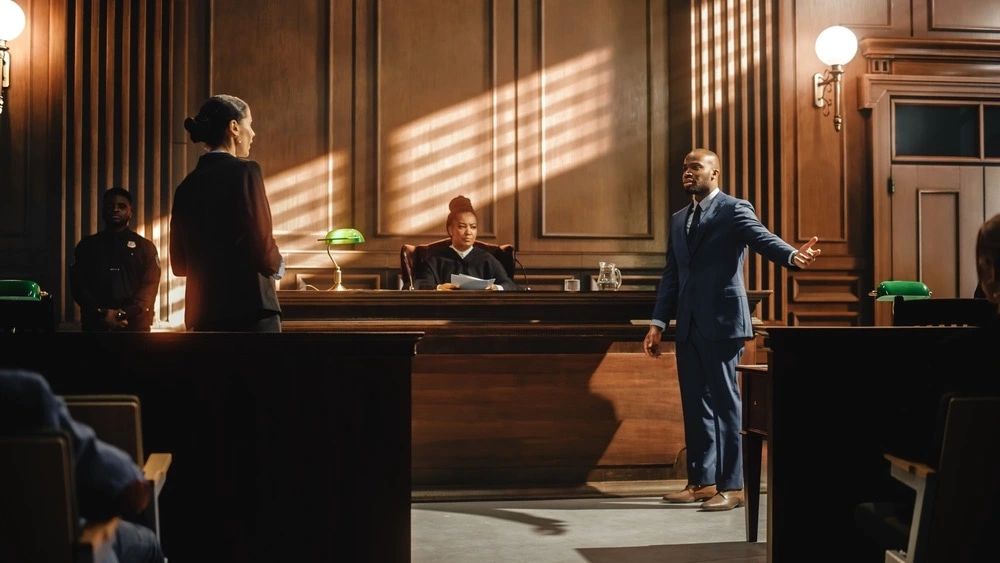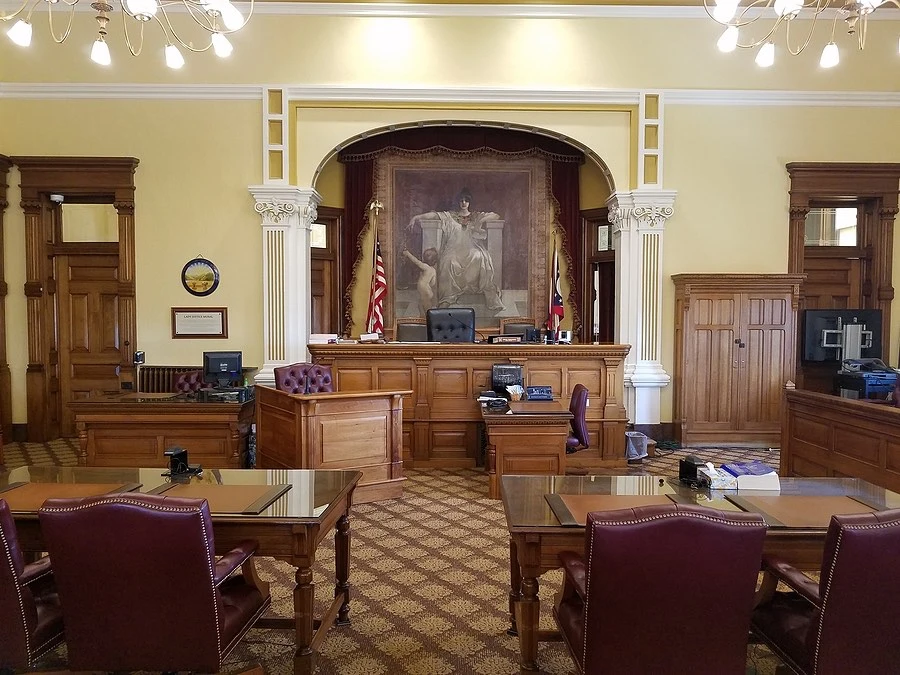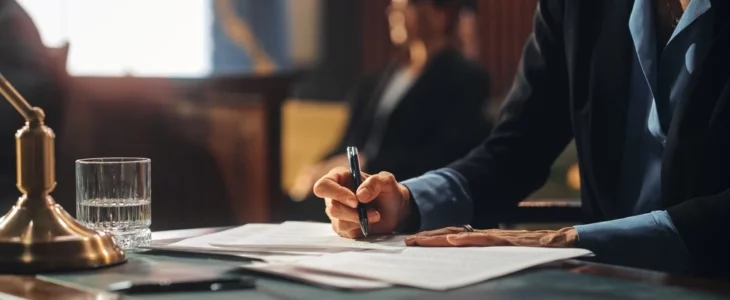The decision to go to trial in a Texas divorce is never easy. It can be emotionally draining and financially costly. But when important issues like child custody, property division, or spousal support can’t be resolved through negotiation, a trial may be the only option to protect your rights and secure your future.
Key Takeaways
- Divorce trials in Texas are often a last resort when negotiations fail, involving complex issues of asset division, child custody, and spousal support.
- Preparation is critical, encompassing the gathering of evidence, legal strategizing with an attorney, and emotional readiness to face the trial’s challenges.
- Post-trial processes include implementing the final divorce decree and potentially appealing the decision if there are grounds for believing an error was made.
Ben Carrasco: Your Experienced Trial Attorney in Austin
Ben Carrasco has extensive experience representing clients in Texas divorce trials. He understands the complexities of the process and the importance of clear, decisive legal strategies. He’ll work tirelessly to protect your interests and advocate for your desired outcome.
Don’t Face Trial Alone – Get the Support You Need
If you’re preparing for a divorce trial in Texas, don’t navigate it alone. Contact Ben Carrasco Law today for a confidential consultation. We’ll discuss your case, answer your questions, and develop a personalized strategy to help you achieve the best possible outcome.
Your Day in Court: The Texas Divorce Trial Process Explained
Imagine standing at the threshold of a courtroom, the future yet unwritten. A trial for divorce in Texas is not just a legal proceeding; it’s a pivotal moment where life’s shared chapters are carefully unraveled and examined. As the gavel sounds and the trial begins, a tapestry of opening statements, evidence, and closing arguments unfolds, with the fate of:
- community property
- child custody
- spousal support
- child support
- visitation rights
in the balance. It’s a process that requires clarity, preparation, and the guidance of a skilled attorney who can navigate the court’s currents.
This article illuminates the road from the opening argument to the final decision, offering a beacon of understanding for those who must walk it.
Understanding Divorce Trials in Texas

In the Lone Star State, the divorce trial process is a beacon for those seeking resolution amidst the storm of marital dissolution. While most divorce cases find safe harbor through mediation, very few divorces brave the tempestuous waters of the courtroom. It’s a trial process reserved as a last resort, where contested divorces come to rest on the scales of justice under Texas law.
Here, we delve into the depths of what triggers a voyage to trial and the types of trials that await one party against the other, with the skilled divorce attorney serving as the captain navigating through the legal squalls.
When a Divorce Goes to Trial
The decision to set sail for a trial is not taken lightly. It is the path chosen when negotiations run aground and the opposing shores of asset division, child custody, and spousal support remain too distant to bridge. In these contested waters, the trial judge steps in to steer towards a final divorce decree, with evidence presented and third-party witnesses called to testify.
It’s a scenario where the divorce trial process becomes a voyage of discovery, probing the depths of each spouse’s claims and charting a course towards a resolution that serves the best interests of all involved, especially the children.
Types of Divorce Trials: Jury vs. Bench
Navigating through the Texas divorce trial process, one encounters a fork in the river: the bench trial and the less frequented path of the jury trial. The former is where the trial judge presides alone, weighing the evidence without the chorus of a jury’s voices. It’s the more commonly charted course, where the nuances of the divorce case unfold under the judge’s discerning eye.
On the rarer occasion, a jury trial arises, offering a different spectacle where issues like child custody can be placed in the hands of a jury, reflecting the community’s pulse in the courtroom’s heartbeat. This option has its pros and cons, which an experienced attorney should carefully consider before deciding whether to request a jury trial.
Preparing for Your Divorce Trial

As the trial date looms on the horizon, meticulous preparation is like gathering provisions for a long expedition. It involves more than just legal acumen; it’s about assembling a robust dossier of evidence, honing a strategy with your legal team, and fortifying oneself for the emotional rigors ahead.
With a skilled divorce attorney by your side, your legal preparations are akin to mapping the terrain, anticipating obstacles, and setting the stage for a compelling presentation to the court. This groundwork is not only about building a case but also about fostering resilience for the journey through the trial process.
Gathering Evidence
In the calm before the storm of a divorce trial, the gathering of evidence is akin to battening down the hatches. Bank statements, tax returns, and property appraisals form the bulkheads against the opposing attorney’s scrutiny. Engaging in the discovery process is the navigational chart, guiding through interrogatories and depositions, where the court reporter documents every sworn testimony, including those from other third party witnesses. It’s a rigorous quest for the truth, where every piece of evidence presented can sway the final judgment.
With a skilled divorce attorney to guide this expedition, no stone is left unturned, and no hidden asset remains obscured below the surface.
Legal Preparations with Your Attorney
In preparation for the voyage that is a divorce trial, the alliance with a skilled divorce attorney is your anchor. This legal mariner, well-versed in the winds of Texas law, charts a strategic course through the choppy waters of pre-trial motions and legal process. The attorney’s counsel is a lighthouse, guiding through practice sessions for court testimony, ensuring clarity and consistency when the waves of cross-examination seek to unsettle.
With their experienced hand on the tiller, the divorce trial process, including uncontested divorce cases, becomes less about navigating through the fog and more about sailing toward the clarity of a fair and just outcome.
Personal and Emotional Preparation
As the trial date draws near, the tempest of emotions requires its own preparation. The support of family and friends serves as a lifeline, and the counsel of mental health professionals can be the compass that guides through the storm. It’s about maintaining a steady keel in other life areas, avoiding unnecessary upheavals that could capsize one’s emotional balance.
Knowing the courtroom etiquette, from the dress to demeanor, is like knowing the rules of the sea; it ensures a respectful navigation through the trial’s proceedings, where one’s personal composure can be as crucial as the legal strategy itself.
The Divorce Trial Process

Once the pre-trial preparations are charted, the divorce trial process unfolds like a journey through uncharted waters. Starting with the filing of the divorce petition, the divorce process officially embarks on a course that leads to the presentation of evidence and witness testimonies. As the trial begins, opening statements from each party’s legal navigators lay out the map of their arguments, setting the stage for what lies ahead.
From the pre-trial hearings to the final decision, each step is a waypoint marking progress toward the ultimate destination: the judge’s final ruling and the issuance of the final divorce decree.
Pre-Trial Hearings and Conferences
Before the main voyage of the trial begins, pre-trial hearings and conferences are the checkpoints where preliminary matters are addressed. These gatherings serve as a chance to navigate toward settlement, with retired judges offering their seasoned perspectives that mirror the trial judge’s likely thought process.
Temporary order hearings act as interim harbors, providing stability for issues like child custody and spousal support until the final decree is anchored. Addressing these preliminary concerns is crucial, as it sets the sail for the direction the trial will take, with each pre-trial motion potentially altering the course of the legal journey.
Opening Statements and Presentation of Evidence
With the compass set, the trial starts in earnest with opening statements – each attorney’s chance to chart out their narrative for the judge. This is followed by the presentation of evidence, where the bedrock of bank statements and the testimony of expert witnesses come into play.
Like navigators presenting their findings to the crew, the lawyers lay out their case piece by piece, guiding the judge through the evidence as if it were a map leading to buried treasure – the treasure, in this case, being a favorable outcome for their client.
Cross-Examination and Closing Arguments
As the trial winds its way through the evidence, cross-examination serves as the squall that tests the strength of each witness’s testimony. Here, opposing attorneys probe and question, seeking to reveal any hidden reefs that may lie beneath a witness’s narrative.
Following the tempest of cross-examination, the closing arguments offer a chance to survey the journey thus far, reminding the court of the route traveled and advocating for the final destination their client seeks. It’s the moment where the attorneys, like seasoned captains, make their final plea for the judge to follow the course they’ve charted.
Judge’s Final Decision and Issuance of the Final Decree
In the quiet after the storm, the judge deliberates, reviewing the navigational charts of evidence and argument laid before them. Their final decision, rendered after careful consideration, becomes the map that parties will follow into their futures. It’s a decree that charts the course for child custody arrangements, navigates the division of marital property, and outlines the shores of child and spousal support.
This document, the final decree of divorce, becomes the legal compass for both parties, setting forth the direction their lives will take post-trial.
Post-Trial Considerations
After the trial concludes and the final judgment is cast, the journey is far from over. The post-trial considerations are like the currents that continue to shape the voyage ahead. Compliance with the final decree is mandatory; any deviation can lead to enforcement actions.
For those who feel the winds of the trial have blown unjustly, there lies the option to appeal the decision, a course that promises rough seas and the potential for a new direction. Navigating these post-trial waters requires an understanding of what lies beyond the courtroom’s horizon and the implications of the court’s final charted course.
Implementing the Final Judgment

The final decree of divorce is the captain’s orders, dictating the new course for both parties. Implementing these orders involves dividing assets as charted by the court and setting the compass for child custody as decreed. Each party must steer by these directives to avoid the rocky shores of legal penalties.
Its terms are the guiding stars by which one must now navigate, and any changes to this navigational chart require at least a year’s journey before modifications can be considered.
Options for Appeal
For those who believe the voyage of the trial has led to an unjust destination, the option to appeal beckons like a lighthouse offering a different path. It’s a challenging course, laden with legal complexities and the need for a strong argument to persuade higher courts to set a new course.
Appeals must be navigated carefully, with a written notice like a flare sent up to signal the intent to contest the trial’s outcome. It’s a path taken when substantial and material changes have occurred, or the law’s compass was not followed correctly.
Common Challenges in Divorce Trials
The voyage through a divorce trial is fraught with challenges that can stir the waters into a tempest. Some of these challenges include:
- Emotional volatility, which can whip up high waves
- Financial disputes and hidden assets, which create undercurrents that can pull the unwary below
- Custody battles, which are the storms that test one’s resolve and the children’s well-being.
Recognizing these challenges is akin to understanding the weather patterns that can affect a journey at sea, and being prepared for them is essential for navigating through to a successful resolution.
Handling Hidden Assets
Hidden assets are like the treacherous shoals that can threaten the equitable division of property. These concealed financial elements can range from offshore accounts to underreported income. Detecting these hidden elements often requires the keen eye of a forensic accountant, a navigator skilled in tracing the flow of funds through murky waters.
Uncovering these assets ensures that the division of property is fair and just, a crucial factor in setting the course for both parties’ financial futures.
Managing High-Conflict Situations
In the tumultuous seas of a high-conflict divorce, the storm of family violence or substantial assets in dispute requires experienced professionals to take the helm. These situations demand specialized strategies to calm the waters, ensuring that the emotional and financial safety of all involved is secured.
Managing these high-conflict situations is not just about navigating through them; it’s about charting a course that leads to a safe harbor for all parties involved.
The Importance of Experienced Legal Representation
In the treacherous waters of a divorce trial, the presence of an experienced divorce attorney is akin to having a seasoned captain at the helm. Such an attorney, like Ben Carrasco, offers more than just knowledge of family law; they bring a strategic acumen honed through years of navigating Texas’s legal seas.
With an expert in command, the complexities of custody battles, the division of assets, and the negotiation of spousal support become navigable. It is this expertise and guidance that can make the difference between being adrift at sea and reaching the shores of a favorable outcome.
Expertise in Texas Law
Sailing through a divorce trial under the Texas flag requires more than just a cursory understanding of the law. With unique guidelines impacting decisions from child custody to alimony, expertise in Texas law becomes the compass guiding one’s journey. An attorney’s deep knowledge of Texas statutes and precedents illuminates the legal landscape, helping to steer clear of pitfalls and ensuring that one’s rights are fiercely protected within the courtroom’s confines.
Strategic Negotiation Skills
Even within the adversarial arena of the courtroom, the art of negotiation remains a powerful tool. Strategic negotiation skills can deftly turn the tides, often preventing the need for a prolonged trial and leading to more amicable resolutions.
Mediation and other alternative dispute resolution methods, guided by the steady hand of a skilled divorce attorney, can smooth the waters, allowing both parties to:
- Collaborate in finding a solution
- Express their interests and concerns
- Preserve their dignity
- Reach a settlement that respects their interests
Safeguarding Your Rights and Interests
During the often stormy seas of a divorce trial, it’s easy to become lost in the turbulence. With experienced legal representation at your side, safeguarding your rights becomes paramount and is done with keen attention to detail. It means keeping a vigilant eye on all aspects of a case, from child custody arrangements to hidden assets.
Protecting one’s interests requires an adept understanding of not only Texas law but also human nature itself. By working tirelessly towards securing one’s goals while protecting their client’s rights, skilled divorce attorneys like Ben Carrasco offer unparalleled guidance through the trials of divorce.
Summary
As our journey through the divorce trial process in Texas comes to a close, we reflect on the importance of understanding each step, from the filing of the divorce petition to the final decree. It’s a voyage that requires preparation, legal knowledge, and emotional fortitude. Remember, with the guidance of an experienced navigator like Ben Carrasco, the tumultuous seas of divorce become surmountable, leading to a new beginning on the horizon. Let this guide be the sextant that helps you chart the waters of your own divorce trial, ensuring that you navigate towards a future filled with hope and resolution.
Frequently Asked Questions
What typically begins the divorce trial process in Texas?
In Texas, the divorce trial process is typically initiated by filing a divorce petition, which sets the course for the legal proceedings to come.
Can Texas divorce trials be decided by a jury?
Yes, Texas divorce trials can involve a jury, but it’s less common compared to bench trials decided by a judge, especially for child custody, property characterization, and grounds for divorce.
How can emotional and personal aspects impact a divorce trial?
Emotional volatility and personal challenges can significantly affect the outcome of a divorce trial. Seeking emotional support and maintaining stability in life are crucial for managing these aspects effectively.
What happens if someone does not comply with the final divorce decree?
If someone does not comply with the final divorce decree, they may face enforcement actions by the court, such as fines or potential jail time. It’s crucial to adhere to the court’s orders within the decree.
Is it possible to modify the final decree of a divorce?
Yes, the final decree of a divorce can be modified if there has been a material and substantial change in circumstances, but not typically within the first year post-issuance. However, any modifications must go through the court and be approved by a judge.



